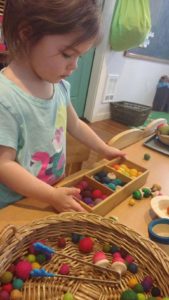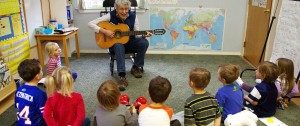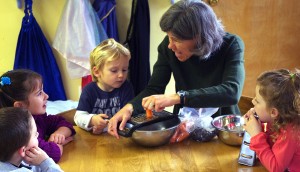 Selkirk School’s Threeschool through Kindergarten curriculum nurtures the growth of a child’s mind, body, and spirit. The school does not follow one specific philosophy or curriculum. Instead, we use an integrated approach that is influenced by several philosophies and teaching practices, including: early childhood current brain research, developmentally-appropriate practices, connection to the natural world, independent school curriculum, and State and National benchmarks. Designed to create real-life connections and understanding of their worlds, students at Selkirk School enjoy an experiential education. A literacy-rich environment, math games, art, hands-on science, seasonal celebrations, movement, and interdisciplinary projects support students as they learn academic skills.
Selkirk School’s Threeschool through Kindergarten curriculum nurtures the growth of a child’s mind, body, and spirit. The school does not follow one specific philosophy or curriculum. Instead, we use an integrated approach that is influenced by several philosophies and teaching practices, including: early childhood current brain research, developmentally-appropriate practices, connection to the natural world, independent school curriculum, and State and National benchmarks. Designed to create real-life connections and understanding of their worlds, students at Selkirk School enjoy an experiential education. A literacy-rich environment, math games, art, hands-on science, seasonal celebrations, movement, and interdisciplinary projects support students as they learn academic skills.
 Our classrooms are interactive environments that meet the highest standards, while meeting the developmental needs of the individual child. The Threeschool and Preschool programs are play-based; the Pre-Kindergarten/Kindergarten grade level classroom has more teacher directed instruction. We value play as the catalyst for young children’s optimal physical growth, social development, and academic learning. It develops all the necessary building blocks for future and academic learning, including: language development, social skills, observation, self-regulation, imagination, planning and gross and fine motor skills. In addition, the children are exposed to daily storytelling, read-alouds, poetry, songs, games, blocks, art, movement, nature, and rest. A consistent rhythm of activities each day supports the students’ needs for structure and security. The curriculum is designed to prepare students to succeed academically and socially in any future school.
Our classrooms are interactive environments that meet the highest standards, while meeting the developmental needs of the individual child. The Threeschool and Preschool programs are play-based; the Pre-Kindergarten/Kindergarten grade level classroom has more teacher directed instruction. We value play as the catalyst for young children’s optimal physical growth, social development, and academic learning. It develops all the necessary building blocks for future and academic learning, including: language development, social skills, observation, self-regulation, imagination, planning and gross and fine motor skills. In addition, the children are exposed to daily storytelling, read-alouds, poetry, songs, games, blocks, art, movement, nature, and rest. A consistent rhythm of activities each day supports the students’ needs for structure and security. The curriculum is designed to prepare students to succeed academically and socially in any future school.
Our curriculum is based upon these goals for Selkirk students:
- Each child will see themself as a member of the Selkirk community, and will value the peers and adults who comprise it.
- Each child will see themself as a self-motivated learner and problem solver.
- Each child will see themself as having responsibilities and self-control as they carry out tasks, routines, and activities.
- Each child will see themself as a physically active, healthy, confident individual.
- Each child will see themself connected to nature through exploration, projects, and play.
- Each child will learn specific knowledge in language arts, mathematics, history, science, art, and world cultures.


